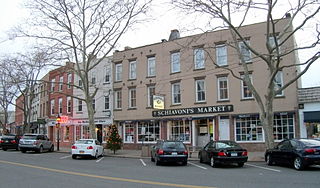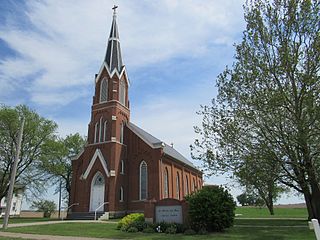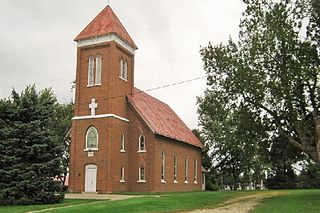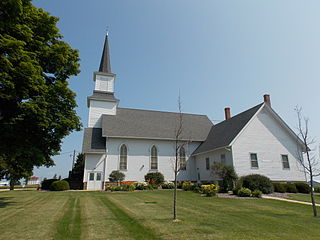Westphalia is a small unincorporated community in Falls County, Texas, United States located 35 mi (56 km) south of Waco on State Highway 320. Westphalia has a strong German and Catholic background. The Church of the Visitation was, until recently, the largest wooden church west of the Mississippi River. Westphalia is mainly noted for its historic church and convents, but also for its meat market and for its annual church picnic, which is one of the largest in the area. Westphalia is also known for the Westphalia Waltz.

Buildings, sites, districts, and objects in Virginia listed on the National Register of Historic Places:

Sag Harbor Village District is a national historic district in Sag Harbor, Suffolk County, New York. It comprises the entire business district of the village. It includes 870 contributing buildings, seven contributing sites, two contributing structures, and three contributing objects. It includes the First Presbyterian Church, a National Historic Landmark building designed by Minard Lafever.

East Perth Cemeteries was the first cemetery established for the Swan River Colony in 1829 in East Perth, Western Australia. It is estimated that as many as 10,000 people were buried there between 1829 and 1919 in seven independently administered denominations or sections which is why the place is known as 'East Perth Cemeteries'. Only around 800 gravesites have been identified. A large section of the original site has since been built over, leaving about 5 hectares remaining.

Oaklawn Cemetery is the first public burial ground in Tampa, Florida, United States. The location was deeded in the mid-19th century and was described as the final resting place for "White and Slave, Rich and Poor". Oaklawn Cemetery is located at the intersection of Morgan Street and Harrison Street in downtown Tampa, about two blocks South of I-275. It has approximately 1,700 graves.

Machpelah Cemetery is located on North Street in Le Roy, New York, United States. It was opened in the mid-19th century and expanded since then. Graves from other, smaller burial grounds around Le Roy have been added. It was listed on the National Register of Historic Places in 2007, one of two cemeteries in Genesee County with that distinction.

The Revolutionary War Cemetery, also called the Old Salem Burying Ground, is located on Archibald Street, just off state highway NY 22 in the village of Salem, New York, United States. It is a 2.6-acre (1.1 ha) area with over a thousand graves, at least 100 of which are those of Revolutionary War dead or veterans.

The Fairmount Historic District is a 409-acre (166 ha) historic district located along County Route 517 in the Fairmount section of Tewksbury Township, near Califon, in Hunterdon County, New Jersey. It was added to the National Register of Historic Places on December 20, 1996 for its significance in architecture, exploration/settlement, and industry. The district includes 72 contributing buildings that were deemed to be contributing to the historic character of the area, plus five contributing structures, nine contributing sites, and one contributing object. One contributing building is located in Washington Township, Morris County.

Saints Peter and Paul Roman Catholic Church is a former parish church of the Diocese of Davenport. The church is located southeast of Harper, Iowa, United States, in Clear Creek Township, Keokuk County. The church building was individually listed on the National Register of Historic Places in 1986. The parish property was listed as a historic district in 2021. The parish was known in the Davenport Diocese as Saints Peter and Paul, Clear Creek.

The Enid Cemetery is a cemetery in Enid, Oklahoma. Together with the Calvary Catholic Cemetery, it has been listed on the National Register of Historic Places since 1996. Opened in the 1890s, the two cemeteries were designed in the rural cemetery style. Only a portion of the Enid Cemetery contributes to the historical significance: the Original (1898), First (1918), Second (1920), and Evergreen (1923) additions. Together these encompass a 967 by 1,318-foot (402 m) area historical section.

St. Joseph's Catholic Church is a former parish of the Diocese of Davenport. The church is located in Dallas township in rural Marion County, Iowa, United States. It was part of the now defunct village of Bauer. The closest communities are Melcher-Dallas and Lacona. The church building still stands and together with the adjacent cemetery comprises an historic district listed on the National Register of Historic Places.

New Mount Sinai Cemetery is a 52-acre (21 ha) cemetery in St. Louis, Missouri. Its first burial was in 1853, and its rural cemetery landscape design was laid out in 1907. It was listed on the National Register of Historic Places in 2005. As of the 2005 listing, the cemetery also has a Modern-style community mausoleum, three private mausoleums, and a formal Japanese garden.

St. Boniface Catholic Church is a parish of the Diocese of Des Moines. The church is located in Westphalia, Iowa, United States, and the parish plant is listed on the National Register of Historic Places as Saint Boniface Catholic Church District. At the time of its nomination the district consisted of 16 resources, including six contributing buildings, one contributing structure, two contributing sites, one contributing object, six noncontributing buildings, and one noncontributing object.

Since 1895, Fountain Park has hosted an annual Chatauqua to promote traditional values and religious, social and educational activities. It was added to the National Register of Historic Places on December 7, 2001.

The Newville Historic District is a national historic district which is located in Newville, Cumberland County, Pennsylvania. The district is bordered roughly by Cove Alley, Big Spring Creek, the right-of-way for the Cumberland Valley Railroad, and Washington Street, and encompasses 414 contributing buildings, one contributing site, and two contributing objects in the central business district and surrounding residential areas of Newville.

Our Savior's Kvindherred Lutheran Church is an Evangelical Lutheran Church in America congregation located near the town of Calamus in rural Clinton County, Iowa, United States. The church and former school buildings as well as the church cemetery were listed as an historic district on the National Register of Historic Places in 2000.

The Old Newton Burial Ground is a historic cemetery located in Newton, Sussex County, New Jersey. The cemetery was the primary burial ground in the town for a century after its establishment in 1762. As the burial ground would reach capacity, the state legislature incorporated the Newton Cemetery Company which began operating a new cemetery in 1867. After this time, interments would continue at the old burial ground intermittently until 1943. The burial ground contains the graves of members of local families from Newton and the surrounding areas, and includes several local and state political figures, prominent citizens, and veterans. While nineteenth-century sources attest 5,000 burials within the cemetery, a recent transcription lists only 1,287 individual known graves.

St. John's Lutheran Church is located in rural Franklin County, Iowa, United States, west of the city of Hampton. The church property was listed as a historic district on the National Register of Historic Places as St. John's Danish Evangelical Lutheran Church in 2015. At the time of its nomination it contained ten resources, which included five contributing buildings, two contributing sites, one contributing structure, one contributing object, and one non-contributing structure.

Oak Hill Cemetery is a rural cemetery located in Cedar Rapids, Iowa, United States. It was listed as a historic district on the National Register of Historic Places in 2013. At the time of its nomination it consisted of 17 resources, which included 13 contributing buildings, one contributing site, two contributing structures, and one contributing object.
Holy Guardian Angels Church and Cemetery Historic District is a nationally recognized historic district located in Roselle, Iowa, United States. Holy Guardian Angels is a former Catholic parish of the Diocese of Sioux City. The historic district made up of the former parish church and cemetery was listed on the National Register of Historic Places in 2019. It is significant for the architecture of the Gothic Revival church and the influence of the German-Catholic immigrants who settled the area.

























